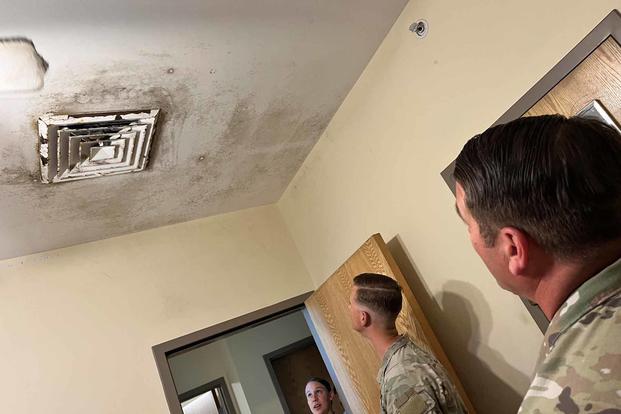The military will get an infusion of billions of dollars to repair and build more barracks and privatized military housing as part of the $1.7 trillion government funding bill passed by Congress on Friday.
The bill, known as an omnibus, includes $17.4 billion for the services' facilities sustainment, restoration and maintenance, or FSRM, accounts, the funding used to fix issues such as moldy barracks.
The omnibus also includes $2 billion for on-base privatized family housing, which has had its own issues with mold.
Read Next: More Than a Million Tricare Users Must Switch Managers After Massive Contract Decision
The House approved the bill in a largely party-line 225-201 vote Friday, sending it to President Joe Biden's desk for his signature after the Senate also approved the bill Thursday. Passing the bill averts a government shutdown that would have started after current government funding expires at midnight.
Mold, which is known to cause several health issues including breathing problems and skin infections, has been plaguing military housing for years, but has recently become an even greater concern after unlivable conditions forced officials at Fort Bragg to move about 1,200 soldiers out of that base's Smoke Bomb Hill barracks.
The FSRM funding in the omnibus is about $1.5 billion more than what the administration requested.
The separate military construction budget includes at least $262 million in "congressionally directed spending," better known as earmarks, to design or build new barracks.
That includes $15.9 million requested by Sen. Jerry Moran, R-Kansas, for planning and design of unaccompanied enlisted barracks at Fort Riley; $19 million requested by Rep. John Carter, R-Texas, to complete barracks at Fort Hood; $82.2 million requested by Sen. Dianne Feinstein, D-Calif., for recruit barracks at Marine Corps Recruit Depot San Diego; $75.9 million requested by Sen. Lindsey Graham, R-S.C., for recruit barracks at Parris Island; and $69 million requested by Sen. Tammy Baldwin, D-Wis., for transient training enlisted and officer barracks at Fort McCoy.
Not all the FSRM funding will go toward barracks repairs. For example, $265 million is set aside specifically for improvements to the facilities used to house the Army's 3rd Infantry Regiment horses, where several deaths have cast the spotlight on small, unsanitary stables.
And while the funding is more than requested, it is still barely a dent in the military's maintenance backlog.
A January report from the Government Accountability Office found the military had a backlog of at least $137 billion in deferred maintenance as of fiscal year 2020 -- the equivalent of about 12 years of facilities funding at the 2020 level.
A separate report from the Congressional Budget Office published in November found the Army's backlog is about $54 billion in 2020 dollars.
The Army's share of the FSRM funding is $5.1 billion for active duty, $384 million for the reserves and $1.1 billion for the Army National Guard.
Meanwhile, lawmakers for years have been fuming about unsafe living conditions in on-base housing owned by private contractors. The issues have included mold, rodent infestations, shoddy wiring and lead-based paint.
Lawmakers have taken steps in previous bills to improve living conditions and give tenants more negotiating leverage when the private landlords ignore their maintenance requests, but the issues have persisted.
The $2 billion for construction, maintenance and operation of family housing is about $30 million more than the Biden administration requested. The extra money is specifically intended to improve oversight of both privately owned and government-owned housing.
The congressional report accompanying the omnibus also calls for each service secretary to submit a report to Congress on the current condition of all privatized housing, a summary of all tenant complaints, a performance review of each management company and information on all known and alleged instances of incentive fee fraud. The report does not carry the weight of law, but directions for reports are typically honored.
"The Committees believe that the [Military Housing Privatization Initiative] management companies have woefully neglected responsibilities outlined in their partnership agreements with the Services," lawmakers wrote in the report. "The Committees continue to receive evidence of poor housing conditions, inadequate maintenance response times, mishandling of claims, indifference towards the wellbeing of servicemembers and their families, and some incidences of illegal incentive fee fraud."
-- Rebecca Kheel can be reached at rebecca.kheel@military.com. Follow her on Twitter @reporterkheel.
Related: VA to Get 22% Budget Boost for Medical Care In Government Spending Deal











